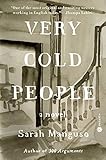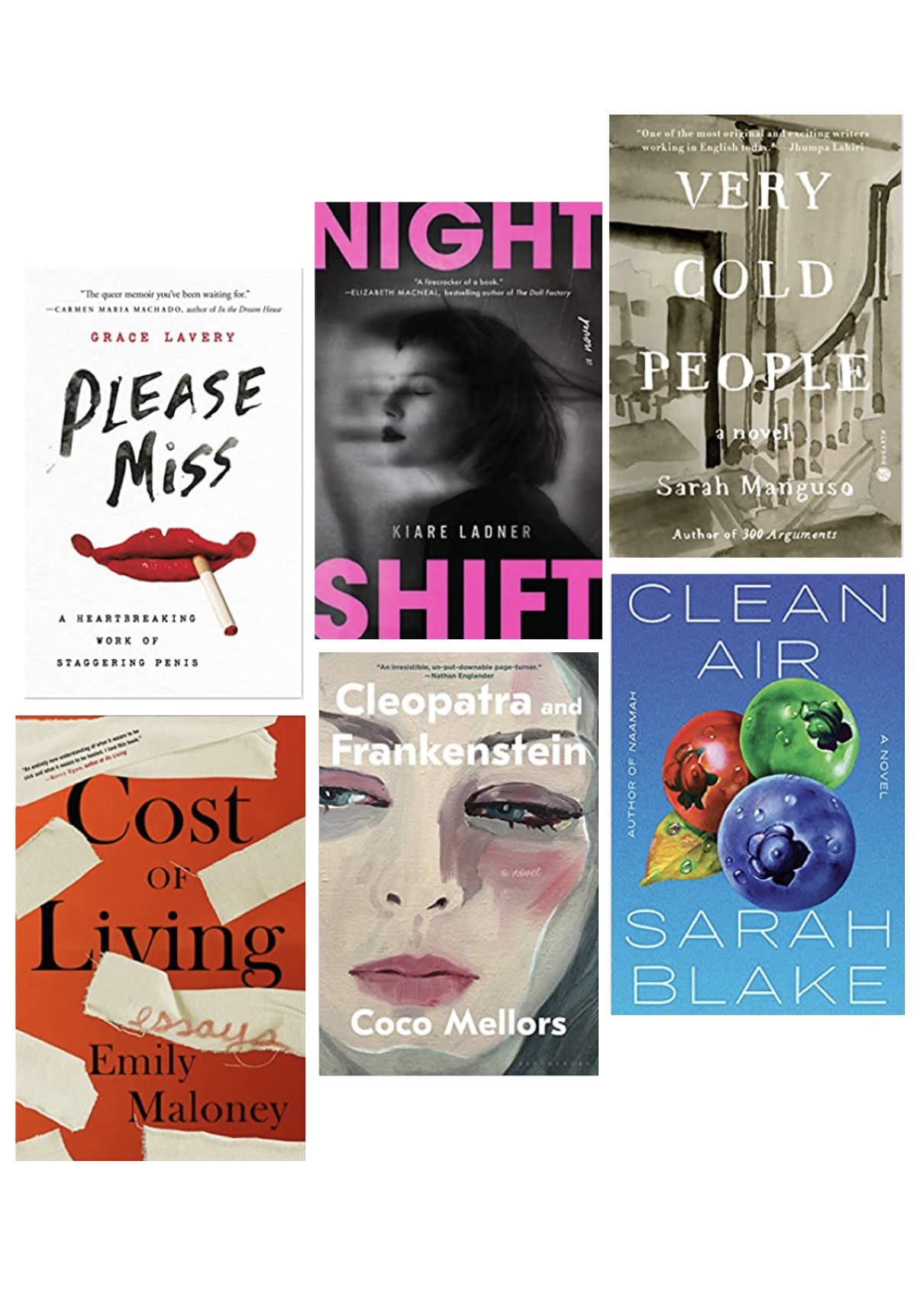Here’s a quick look at some notable books—new titles from Sarah Manguso, Sarah Blake, Grace Lavery, and more—that are publishing this week.
Want to learn more about upcoming titles? Then go read our most recent book preview. Want to help The Millions keep churning out great books coverage? Then become a member today.
 Very Cold People by Sarah Manguso
Very Cold People by Sarah Manguso
Here’s what Publishers Weekly had to say about Very Cold People: “A solemn yet deeply empathic bildungsroman, Manguso’s debut novel (after the essay collection 300 Arguments) centers on a girl whose life unravels in a fictional Massachusetts town. The only child of a European Jewish mother and an Italian father, Ruth has spent her entire youth in Waitsfield, a place defined by its colonial histories and class differences. She shares stories of her personal and ancestral history in abbreviated accounts, delving into how the traumas of poverty pervaded every aspect of her and her family’s life, as well as how the abuse that Ruth and her friends continuously suffered at the hands of their parents, teachers, and caretakers impinged on their ability to imagine a life outside of Waitsfield. The vignettes don’t have a lot of momentum, but as a whole they render a sweeping view of a girl’s troubled coming-of-age with a solemnity that both wonders at and highlights the heartbreakingly persistent hope that lies at the core of Ruth’s life story. Manguso’s complex work will inspire reflection.”
 Clean Air by Sarah Blake
Clean Air by Sarah Blake
Here’s what Publishers Weekly had to say about Clean Air: “Blake’s fascinating, idiosyncratic second novel (after 2019’s Namaah) constructs a haunting post-apocalyptic world with which a withdrawn woman must finally come to terms when someone starts killing local families. In 2032, trees began producing more pollen than human bodies could handle, killing billions of people. Ten years later, the survivors of what’s called the Turning carefully navigate a world where it’s not safe to be outside for more than seconds at a time. Among them is Izabel, who meanders through her days feeling vaguely dissatisfied with life with her husband, Kaito, and four-year-old daughter, Cami. When Cami develops inexplicable sleep issues around the same time a serial killer starts slashing the plastic sheeting enclosing nearby homes and letting in the toxic air, Izabel ends up in the best position to solve the mystery, following clues in the phrases Cami mutters in her sleep. The novel’s tone is restrained, sometimes verging on mannered, which belies the gradual but effective accumulation of emotions and images. The skillful blend of post-apocalyptic science fiction, supernatural murder mystery, and domestic drama is unexpected and entirely engrossing.”
 Cost of Living by Emily Maloney
Cost of Living by Emily Maloney
Here’s what Publishers Weekly had to say about Cost of Living: “Maloney artfully unpacks the fraught connection between money and health in her brilliant debut collection. She began working as an emergency room technician to pay off medical debt that piled up after a suicide attempt, and with subtle wit and moving vulnerability, she explores how survival is dependent on capital, offering a unique perspective on the American health-care system. In ‘A Brief Inventory of My Drugs and Their Retail Price,’ Maloney decries the cost of the medications prescribed to her for her mental health care: ‘Why was living so much easier for everyone else?’ she laments. ‘Training Days, or On Experience’ details the evangelizing EMT instructor who introduced Maloney to the harshness and patriarchy present in her field, while ‘Something for the Pain’ amounts to a compassionate take on the relationship between chronic pain sufferers and big pharma. As she writes, ‘I am always suspect of people in pain. Or I was. Or I can be.’ Maloney is masterful at beginning in a place of skepticism and ending with empathy, all while weaving in her own fascinating story. Readers will be eager to see where she goes next.”
 Nightshift by Kiare Ladner
Nightshift by Kiare Ladner
Here’s what Publishers Weekly had to say about Nightshift: “A friendship grows into a life-altering obsession in Ladner’s alluring debut set in late 1990s London. Meggie Groenewald meets Sabine Dubreil at her media-monitoring job when they’re both 23, and she detects a push-pull dynamic between them from the start. At the same time, Meggie is pursuing a literature degree and has a boyfriend, yet a small part of her yearns for another kind of life, or even to be another person. So when Sabine transfers to the night shift at a grubby warehouse near London Bridge, Meggie follows. There, Sabine kisses Meggie, setting in motion a shift in Meggie’s world. Meggie begins hanging out at pubs with the night crew and Sabine, who calls her ‘my cute friend who I kiss’ but lets her get no closer. It prompts Meggie to test her sexuality with another woman, though she returns to and plans to move in with her boyfriend. But on the day of the move, Meggie goes on a coke binge with the crew. Though some late revelations are unexpectedly disturbing given the lighter tone that precedes them, Ladner sustains a deliriously lurid rabbit hole for Meggie to go down as she fixates on her unreliable ‘fairy tale friend’ who she longs not only to know but also to be. The result is a tense and affecting tale of awakening.”
 Cleopatra and Frankenstein by Coco Mellors
Cleopatra and Frankenstein by Coco Mellors
Here’s what Publishers Weekly had to say about Cleopatra and Frankenstein: “In this involving if strained debut, Mellors dissects the tumultuous relationship between two magnetic and damaged people. Frank, a successful ad executive with a worsening drinking problem, meets Cleo, an aspiring British painter 20 years his junior, on New Year’s Eve in Manhattan, and they begin an affair. Six months later, they’re married. Soon, resentment, carelessness, infidelity, and unresolved issues from their childhoods come between them (Frank’s mother was an emotionally distant alcoholic and Cleo’s died by suicide), but their intoxicating chemistry keeps them together. Mellors leavens this marital Sturm und Drang with a satirical portrait of present-day New York life. Some of it lands—one of Cleo’s friends dismisses a man for having ‘shoe trees in all his shoes, even the sneakers. Like a psychopath’—but too often it reads like caricature. Zoe, Frank’s younger half-sister, attends a ‘Climaxing to Consciousness’ workshop; Santiago, a Peruvian chef, laments that he is ‘The fat friend. The sidekick. But I have feelings. I feel a lot.’ A notable exception is Eleanor, a screenwriter who takes a freelance job at Frank’s firm and develops a flirtation with him. Her winning sections achieve the mix of wit, pathos, and romance the rest strives to attain. The tone and intrigue can feel a bit scattered, but an enticing aura glows at this work’s heart.”
 Please Miss by Grace Lavery
Please Miss by Grace Lavery
Here’s what Publishers Weekly had to say about Please Miss: “Essayist and UC Berkeley professor Lavery debuts with a surreal speculative memoir that’s by turns engrossing and impenetrable. As indicated by the book’s subtitle, Lavery aims to rub out the dividing line between the intellectual and the bawdy to subvert the typical transgender memoir (or, as one friend interprets the genre: ‘expositions of trans life as it is lived’). Recounting how she solved her ‘penis problem’ and began taking synthetic estrogen, Lavery explores transcendental erotic self-realization, her history of drug and alcohol use, and the paradigmatic concept of the penis (‘an organ defined, at least in the Lacanian tradition, by its failure to be a phallus’) through absurdist tall tales. She receives a series of bizarre letters from a group of clowns; relishes a sexually charged FAQ for finger limes (a podlike type of citrus) from ‘Hole Foods’; and ruminates on a parodic column about Little Shop of Horrors from Trump biographer (and former media mogul turned convicted fraudster) Conrad Black. It’s not the blurring of distinctions between fantasy and reality that clouds the book’s clarity, however, but Lavery’s deeply academic discourse; without a comprehensive knowledge of Dickens and Lacan, many readers will too often be left in the dark trying to decipher what it is Lavery is attempting to say. LGBTQ literati will find much to explore, but others may have more homework to do first.”
Also on shelves this week: The Goodness of St. Rocque by Alice Dunbar-Nelson.










